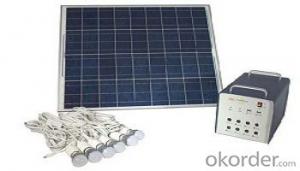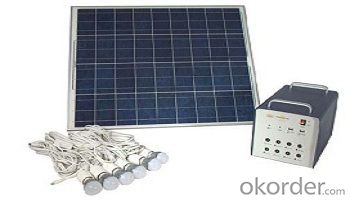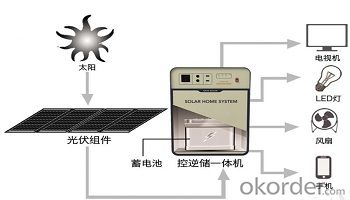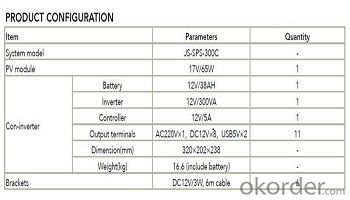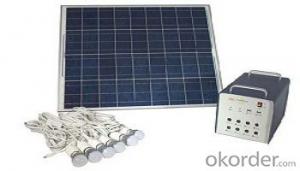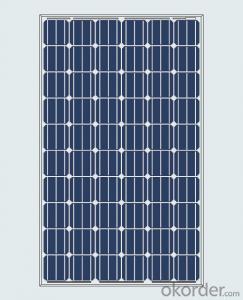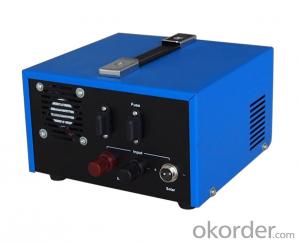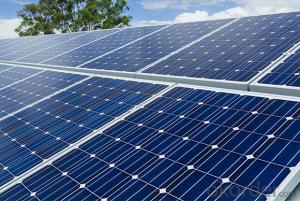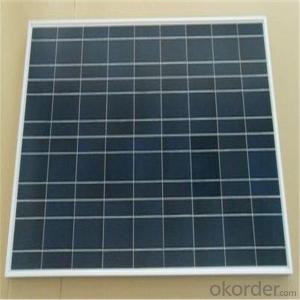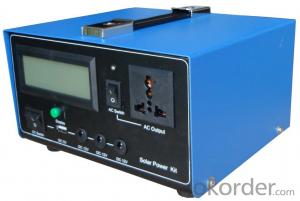Sun First Solar Energy Systems - SPS 300C SunPower Solar Module with LED Lighting
- Loading Port:
- China main port
- Payment Terms:
- TT OR LC
- Min Order Qty:
- 10 watt
- Supply Capability:
- 100000 watt/month
OKorder Service Pledge
OKorder Financial Service
You Might Also Like
Product Description:
Name: SPS-300C sunpower solar module
Solar power system provides alternating current and direct current, which is produced by the modules transforming solar power into power, to home lighting, household appliance and other DC appliance, such as cell phone and laptop.
Solar power system is widely used in area lack of power, for example house power supplying, monitoring, communication base, fire prevention in forest area, pasture and meadow, aquaculture etc.
Solar DC Lighting System
Multiple protection system, safe and reliable performance.
Integrated and portable design, easy operation.
DC5V, DC12V, AC220V output, wide range application.
Clean engergy, cycle use.
Packaging & Delivery:
Packaging Detail: Quantity of carton :3pcs Color Box size: 28.5*11.5*487.5px , 2.66kg/pc Carton size: 36.5*31*575px G.W/N.W: 8.7/8.0 kg
Delivery Detail: 25 working days according to order quantity
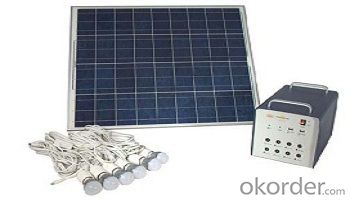
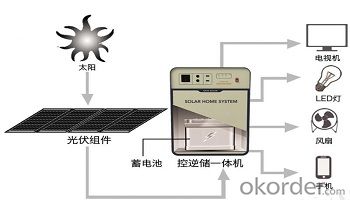
Advantages:
1.Solar Energy&green energy.
2. Easy to install, operate and maintain.
3. Ideal lighting products where normal electric is not convenient.
Packing details:
Quantity of carton :3pcs
Color Box size: 28.5*11.5*487.5px ,
2.66kg/pc
Carton size: 36.5*31*575px
G.W/N.W: 8.7/8.0 kg
Our services:
1. Sample: Sample is available. Please send us email about your detail consignee information: name, address, zip code and tel. Then we will contact you and send samples to you.
2. Small order: We can accept small order for this product. Please let us know your order quantity.
3. Customize: We accept OEM service and can customize products as customers' design.
4. After-sales service: We will give customers active feedback within 24hours after receive any of customers' questions.
- Q: What is the difference between a solar tracker and a fixed-tilt solar energy system?
- A solar tracker is a system that follows the movement of the sun throughout the day, adjusting the position of solar panels to maximize sunlight exposure. On the other hand, a fixed-tilt solar energy system consists of solar panels that are mounted at a fixed angle, typically facing south, and do not move throughout the day. The main difference lies in their ability to track the sun's movement, resulting in increased energy production for solar trackers compared to fixed-tilt systems.
- Q: Are there any risks of theft or vandalism with solar energy systems?
- Yes, there are some risks of theft or vandalism associated with solar energy systems. Solar panels, inverters, and batteries can be attractive targets for thieves due to their high value. Additionally, vandalism can occur, such as intentional damage to solar panels or theft of crucial components. However, there are preventive measures that can be implemented, such as installing security systems, using tamper-proof equipment, and ensuring proper insurance coverage to mitigate these risks.
- Q: What are the different financing models for installing solar energy systems?
- There are several financing models available for installing solar energy systems, depending on individual preferences and financial capabilities. Here are some of the common financing options: 1. Outright Purchase: The most straightforward option is to purchase the solar energy system outright. This requires a significant upfront investment, but it allows the homeowner or business owner to benefit from the full savings and incentives associated with solar energy, including tax credits and lower utility bills. 2. Solar Loans: Many financial institutions offer specialized loans for solar installations. These loans typically have lower interest rates and longer repayment terms compared to traditional loans. With a solar loan, the system owner makes monthly payments to the lender while enjoying the financial benefits of lower utility bills and potential tax credits. 3. Power Purchase Agreements (PPAs): A PPA is a contract between the solar system owner and a third-party solar provider. Under this arrangement, the solar provider installs and maintains the system on the customer's property, and the customer agrees to purchase the electricity generated by the system at a predetermined rate. This eliminates the need for upfront costs and allows the customer to benefit from immediate savings on their electricity bill. 4. Solar Leases: Similar to PPAs, solar leases involve a third-party solar provider installing and maintaining the system. However, instead of purchasing the electricity, the customer pays a fixed monthly lease payment for the use of the solar energy system. While this option may not provide as much savings as the other financing models, it requires little to no upfront investment. 5. Property Assessed Clean Energy (PACE) Financing: PACE financing allows property owners to finance the installation of solar energy systems through an assessment on their property tax bill. The loan is repaid over a period of time, typically 10 to 20 years, through an additional assessment on the property taxes. PACE financing is especially beneficial for property owners who may not qualify for traditional loans or who prefer to spread out the cost of the solar installation over a longer period. These are just a few examples of the different financing models available for installing solar energy systems. It is important to carefully evaluate each option, considering factors such as upfront costs, long-term savings, and individual financial goals, in order to determine the most suitable financing arrangement for your specific circumstances.
- Q: Can solar energy systems be used in all climates?
- Solar energy systems can be used in all climates to some extent, but their efficiency and effectiveness may vary. While solar panels can generate electricity even in colder climates, they may produce less energy compared to sunnier regions. Additionally, extreme weather conditions like heavy snowfall or frequent cloud cover can temporarily reduce solar energy production. However, advancements in solar technology, such as the use of dual-axis tracking systems, can help optimize energy generation in different climates.
- Q: Are there any risks of electrical fires with solar energy systems?
- Solar energy systems, although generally regarded as safe, do pose potential risks of electrical fires. The improper installation or maintenance of the system stands as one of the primary hazards. Inadequate wiring or faulty electrical connections can result in overheating and fire hazards. Moreover, insufficient grounding of solar panels or system faults can also heighten the likelihood of electrical fires. Hence, it is vital to enlist the services of qualified professionals for both installation and regular maintenance of solar energy systems, effectively minimizing these risks. To further diminish the chances of electrical fires, it is crucial to adhere to fire safety measures, including the use of appropriate wiring, the installation of proper fire detection and suppression systems, and ensuring sufficient ventilation surrounding the solar panels. Consequently, despite solar energy systems generally being safe, it is imperative to acknowledge these risks and implement necessary precautions to mitigate them.
- Q: How do solar energy systems impact the demand for traditional energy sources?
- Solar energy systems have a significant impact on the demand for traditional energy sources. As more and more solar panels are installed and integrated into the power grid, the reliance on fossil fuels decreases. This is because solar energy systems generate electricity directly from sunlight, eliminating the need for traditional energy sources such as coal, oil, and natural gas. The increased adoption of solar energy systems reduces the demand for traditional energy sources in several ways. Firstly, solar power can be produced locally, reducing the need for long-distance transmission of electricity from power plants. This reduces transmission losses and the associated costs, making solar energy more economically viable. Secondly, solar energy systems generate electricity during daylight hours when demand is typically high, especially in residential and commercial settings. This reduces the strain on traditional energy sources during peak demand periods, which can help stabilize the power grid and prevent blackouts or shortages. Furthermore, the integration of solar energy systems into the power grid allows for excess electricity to be fed back into the grid. This surplus energy can be used by other consumers, reducing the overall demand for traditional energy sources. This concept, known as net metering, not only reduces the reliance on traditional energy sources but also incentivizes the adoption of solar energy systems. Overall, the widespread use of solar energy systems has a positive impact on the demand for traditional energy sources. It reduces the need for fossil fuels, promotes energy independence, and contributes to the global transition towards clean and renewable energy sources. However, it is important to note that complete replacement of traditional energy sources with solar energy is not feasible in all situations, and a balanced energy mix is still necessary to meet the diverse energy demands of society.
- Q: Can solar energy systems be used for powering streetlights or outdoor lighting?
- Yes, solar energy systems can definitely be used for powering streetlights or outdoor lighting. Solar-powered streetlights and outdoor lighting systems are becoming increasingly popular as they offer a sustainable and cost-effective solution. These systems harness energy from the sun during the day, store it in batteries, and then use it to power the lights at night. This reduces dependence on traditional electricity sources and helps in reducing carbon emissions, making it an environmentally friendly option for outdoor lighting.
- Q: Can solar energy systems be used in areas with protected wildlife habitats?
- Yes, solar energy systems can be used in areas with protected wildlife habitats. In fact, solar energy is considered a more environmentally friendly and sustainable alternative to traditional energy sources, making it compatible with wildlife preservation efforts. By utilizing solar power, we can minimize the impact on ecosystems and reduce habitat destruction associated with conventional energy generation methods.
- Q: Can solar energy systems be used for powering construction or building sites?
- Yes, solar energy systems can definitely be used for powering construction or building sites. Solar panels can be installed on rooftops, open spaces, or even on temporary structures at the site to capture sunlight and convert it into electricity. This renewable energy source can provide a reliable and sustainable power supply to run tools, equipment, lighting, and other electrical needs on construction sites, reducing the reliance on fossil fuels and minimizing environmental impact.
- Q: Can solar energy systems be used off-grid?
- Yes, solar energy systems can be used off-grid. Off-grid solar systems are designed to generate and store electricity independently without being connected to the traditional power grid. These systems typically consist of solar panels, batteries for energy storage, and inverters to convert the stored energy into usable electricity. Off-grid solar energy systems are particularly useful in remote areas where access to the grid is limited or unavailable, providing a sustainable and reliable source of power.
Send your message to us
Sun First Solar Energy Systems - SPS 300C SunPower Solar Module with LED Lighting
- Loading Port:
- China main port
- Payment Terms:
- TT OR LC
- Min Order Qty:
- 10 watt
- Supply Capability:
- 100000 watt/month
OKorder Service Pledge
OKorder Financial Service
Similar products
Hot products
Hot Searches
Related keywords
